
U.S. Secretary of Agriculture Sonny Perdue proposed transitioning the oversight of bioengineered food animals to the United States Department of Agriculture (USDA) last week.
On December 21. the USDA filed an advance notice of proposed rulemaking into the Federal Register to solicit “public comment on establishing regulations for the movement of certain animals modified or developed by genetic engineering.”
Previously, the Food and Drug Administration (FDA) was responsible for the regulation of genetically modified animals raised for food. The FDA recently made headlines when it approved the sale of genetically modified pigs for use in food in medicine earlier in December.
“Science-based advances in biotechnology have great promise to continue to enhance rural prosperity and improve the quality of life across America’s heartland and around the globe. With this effort, we are outlining a pragmatic, science-based and risk-based approach that focuses on potential risk to animal and livestock health, the environment and food safety in order to provide our farmers and ranchers the tools they need to continue to feed, clothe and fuel the world,” Perdue said.
Genetic engineering has the potential to transform food production. The technology has already helped advance research into avian reovirus vaccinations, improving meat quality during bird development, lead to better welfare and husbandry for layers and better detect foodborne pathogens during processing.
In addition, a recently announced project hopes to use gene editing to develop poultry that is resistant against avian influenza.
In charge of regulating safety
Under the proposed plan, the USDA would become the agency responsible for determining whether genetically engineered animals are safe to eat. The agency would oversee reviewing the safety and efficacy of genetic modification in the animals, their impact on the environment and overall food safety for the bioengineered products.
The USDA would consult with the FDA on regulation and the FDA would still regulate genetically modified seafood and animals that have been bioengineered for medical reasons.
The initiative follows a 2019 executive order from President Donald Trump to streamline or eliminate the regulatory hurdles preventing innovation in U.S. agriculture.
“Our livestock producers need all the tools in the toolbox to help protect against animal diseases and continue to meet the challenge of feeding everyone now and into the future. If we do not put these safe biotechnology advances to work here at home, our competitors in other nations will,” Perdue wrote.
Like what you just read? Sign up now for free to receive the Poultry Future Newsletter.


















